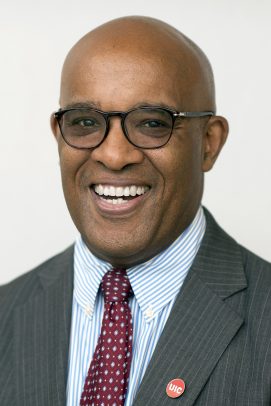UIC School of Public Health tapped for Chicago’s $56M contact tracing initiative
The University of Illinois at Chicago has been selected to co-lead a $56 million, City of Chicago-funded contact tracing program in response to the ongoing COVID-19 pandemic.
The program, which is spearheaded by the Chicago Cook Workforce Partnership, will fund the creation of the COVID Contact Tracing Corps and the COVID Resource Coordination Hub, which together will hire 600 people to provide contact tracing services to all of Chicago to help stem the spread of the virus.
In partnership with the NORC at the University of Chicago, UIC’s School of Public Health will co-lead the resource hub. The school will serve as a strategic partner and training resource for the community-based organizations that will be responsible for hiring the contact tracers, who will be hired directly from the communities of high economic hardship that have been adversely impacted by COVID-19.

“In order to combat the virus, we need contact tracers who are adequately trained to gain trust in Black and Brown communities disproportionately impacted by COVID-19,” said Dr. Wayne Giles, dean of the UIC School of Public Health. “The contact tracers need to come from the impacted communities, and we hope through this work we will create a pathway to the health professions and public health.”
Giles said the majority of the $56 million — about 85% — will support community-based organizations.
“The impact and importance of community organizations is one of the most vital parts of this initiative,” Giles said.
UIC’s Marcus Betts, assistant vice chancellor for external engagement, worked closely with the city and other partners to facilitate team creation and incorporate the community into this plan.
“A world-class city is only as strong as our most vulnerable communities. By hiring from the hardest-hit communities, we create a platform by which contact tracers can help protect their communities and transform their lives through utilizing the skills learned to excel in careers in the health care industry. This represents the greatest and most immediate opportunity to uplift communities impacted by COVID-19. Working with our partners and under the bold vision of Mayor Lightfoot, we look forward to joining this fight against Covid-19 and inequity,” Betts said.
UIC will receive about $800,000.
“Our role will be to provide support to the trainers, contact tracers and about 30 community-based organizations throughout the city,” Giles said. “Not only is this a key opportunity to help our community during the pandemic, this is also an important way that we can support our economy and encourage people to follow career trajectories in public health and, potentially thrive in these fields.”
Also partnering with the Chicago Cook Workforce Partnership are NORC at the University of Chicago, Malcolm X College — one of the City Colleges of Chicago — and Sinai Urban Health Institute.
The Chicago Cook Workforce Partnership and its partners were chosen by a panel of community and city experts from a field of almost two dozen applications.
“COVID-19’s outrageously disproportionate impact on Chicago’s most vulnerable communities has demanded that we as a city step up and take swift action to support our fellow residents in need,” Mayor Lori Lightfoot said. “This exciting contact tracing initiative will not only significantly bolster our efforts to stay ahead of this terrible disease, but it will also create new jobs and opportunities for individuals to join in the fight against COVID-19, as well as develop invaluable skills for their own future careers in public health and patient care.”
“A robust and comprehensive contact tracing program is key to containing the spread of COVID-19 and further driving down the number of new cases,” CDPH Commissioner Dr. Allison Arwady said. “We insisted that this program not only focus on communities most impacted by the virus but that the Partnership and its sub-delegates hire from these neighborhoods to build the contact tracing corps. In that way, this will not only operationalize an important tool in the fight against COVID-19, but also create thriving wage jobs.”
“In addition to suppressing the transmission of COVID-19, contact tracing can be a doorway to family-sustaining careers in the healthcare field,” said Karin Norington-Reaves, CEO of Chicago Cook Workforce Partnership. “Along with our partners, we look forward to not only impacting community health but also creating economic opportunity for African-American and Latinx residents most deeply affected by this pandemic.”
Giles said that public health issues, like the COVID-19 pandemic, require public solutions.
“We cannot fight a pandemic from government or academic offices — efforts need to be in every community and designed to work for communities. The COVID Contact Tracing Corps and the COVID Resource Coordination Hub are key initiatives that I believe will help to support the many diverse communities and vulnerable citizens of Chicago,” Giles said.
Categories
Topics
contact tracing, coronavirus, COVID-19, pandemic, public health, School of Public Health
